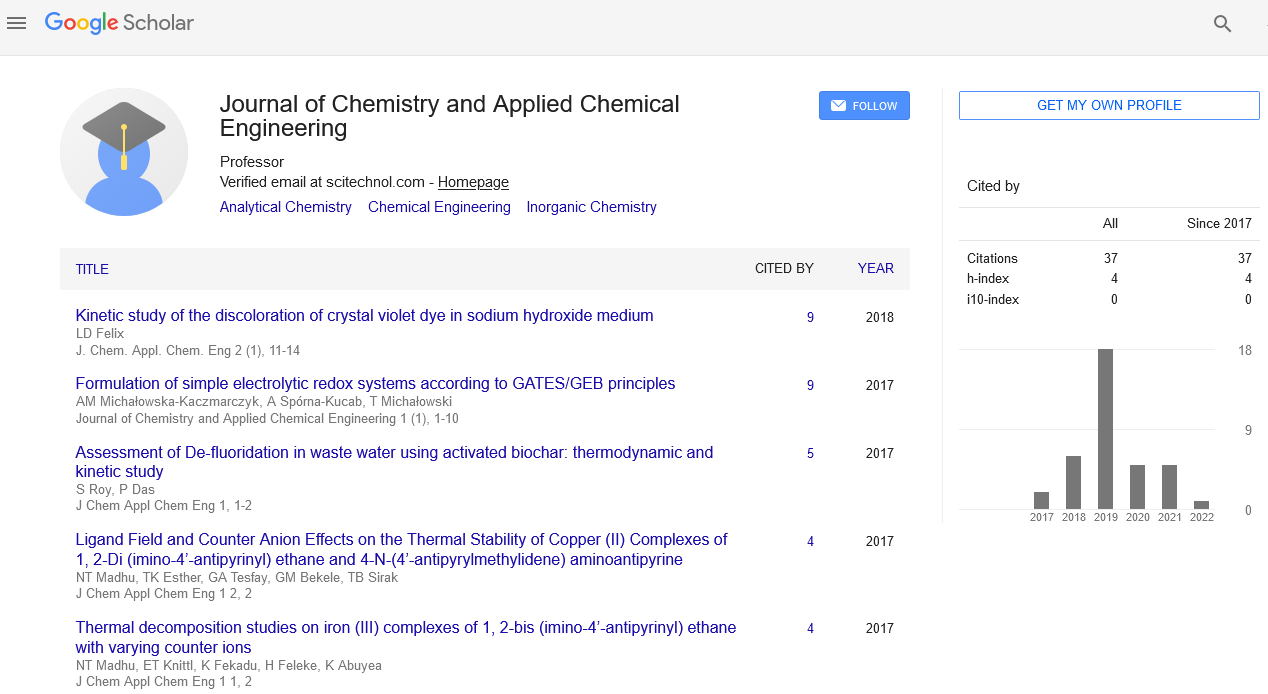Perspective, J Chem Appl Chem Vol: 7 Issue: 2
The Functional Proteome through Chemical Probing
Jahan Barbas*
1Department of Chemistry, Imperial College London, London, UK
*Corresponding Author: Jahan Barbas,
Department of Chemistry, Imperial
College London, London, UK
E-mail: barbasjahan@gmail.com
Received date: 23 May, 2023, Manuscript No. JCACE-23-106791;
Editor assigned date: 25 May, 2023, Pre QC No. JCACE-23-106791 (PQ);
Reviewed date: 08 June, 2023, QC No. JCACE-23-106791;
Revised date: 15 June, 2023, Manuscript No. JCACE-23-106791 (R);
Published date: 22 June, 2023, DOI: 10.4172/Jcace.1000023
Citation: Barbas J (2023) The Functional Proteome through Chemical Probing. J Chem Appl Chem Eng 7:2.
Description
Chemical proteomics is an interdisciplinary field that integrates chemical techniques with proteomics to study the complex interactions between small molecules and proteins within a biological system. It allows researchers to gain valuable insights into protein function, cellular signaling pathways, and disease mechanisms. By combining the strengths of chemistry and proteomics, chemical proteomics has become an indispensable tool in drug discovery, biomarker identification, and understanding protein-protein interactions.
Proteomics is the large-scale study of proteins in a biological system, including their structure, function, and interactions. It involves the identification, quantification, and characterization of proteins, enabling researchers to gain a comprehensive view of the proteome, which represents all the proteins expressed by a cell, tissue, or organism.
Chemical biology and chemical probes
Chemical biology is a field that employs chemical techniques to study and manipulate biological systems. In chemical proteomics, researchers use small molecules, known as chemical probes or ligands, to selectively target specific proteins or protein families. These chemical probes are designed to bind to specific protein targets with high affinity and selectivity, allowing researchers to study the functions and interactions of those proteins in a cellular context.
Activity-Based Protein Profiling is a powerful technique in chemical proteomics that involves the use of chemical probes with reactive groups. These probes covalently bind to the active sites or specific regions of enzymes, resulting in the labeling and enrichment of the active forms of those enzymes. ABPP provides insights into enzyme activities in their native cellular environments and can be used to study various classes of enzymes, including kinases, proteases, and phosphatases.
Target identification and validation
Chemical proteomics is a valuable tool in drug discovery and development. By using chemical probes that interact with specific drug targets, researchers can identify and validate potential drug targets and understand the mechanisms of drug action. This information is important in the early stages of drug development to ensure the efficacy and safety of potential drug candidates.
Chemical proteomics plays a significant role in drug discovery by helping researchers identify and validate new drug targets, study drugprotein interactions, and optimize drug candidates. The use of chemical probes in target identification and validation can accelerate the drug discovery process, leading to the development of more effective and specific therapies.
Protein-protein interactions are critical for cellular signaling and the regulation of biological processes. Chemical proteomics can be employed to study protein-protein interactions, providing insights into signaling pathways and protein complexes involved in various cellular functions. Understanding these interactions is vital for elucidating disease mechanisms and developing therapeutic interventions.
Post-Translational Modifications (PTMs) play an important role in regulating protein function and cellular signaling. Chemical proteomics techniques can be used to profile and quantify PTMs, such as phosphorylation, acetylation, ubiquitination, and glycosylation. This information helps researchers understand the dynamic regulatory networks within cells and how PTMs influence protein activity and localization.
Biomarker discovery
Biomarkers are specific molecules that can indicate the presence or progression of a disease or condition. Chemical proteomics can identify and quantify protein biomarkers associated with various diseases, including cancer, neurodegenerative disorders, and infectious diseases. These biomarkers can be used for early diagnosis, prognosis, and monitoring of disease progression, as well as for assessing therapeutic responses.
Personalized medicine aims to tailor medical treatments to individual patients based on their unique genetic makeup and molecular characteristics. Chemical proteomics can contribute to personalized medicine by providing insights into the individual variations in protein expression and function, guiding the selection of appropriate therapies for specific patients. Despite its significant contributions, chemical proteomics still faces challenges. Developing specific and selective chemical probes for all protein targets remains a complex task. Additionally, the identification and quantification of low-abundance proteins and dynamic protein interactions require further advancements in sensitivity and data analysis.
Chemical proteomics is a powerful and evolving field that bridges chemistry and proteomics to understand the complexity of biological systems at the protein level. Its applications in drug discovery, target validation, protein-protein interactions, and biomarker discovery hold immense promise for advancing our understanding of disease mechanisms and facilitating the development of personalized therapies. As technology and methodologies continue to improve, chemical proteomics will undoubtedly remain at the forefront of biomedical research, driving advancements in medicine and therapeutics.
 Spanish
Spanish  Chinese
Chinese  Russian
Russian  German
German  French
French  Japanese
Japanese  Portuguese
Portuguese  Hindi
Hindi 